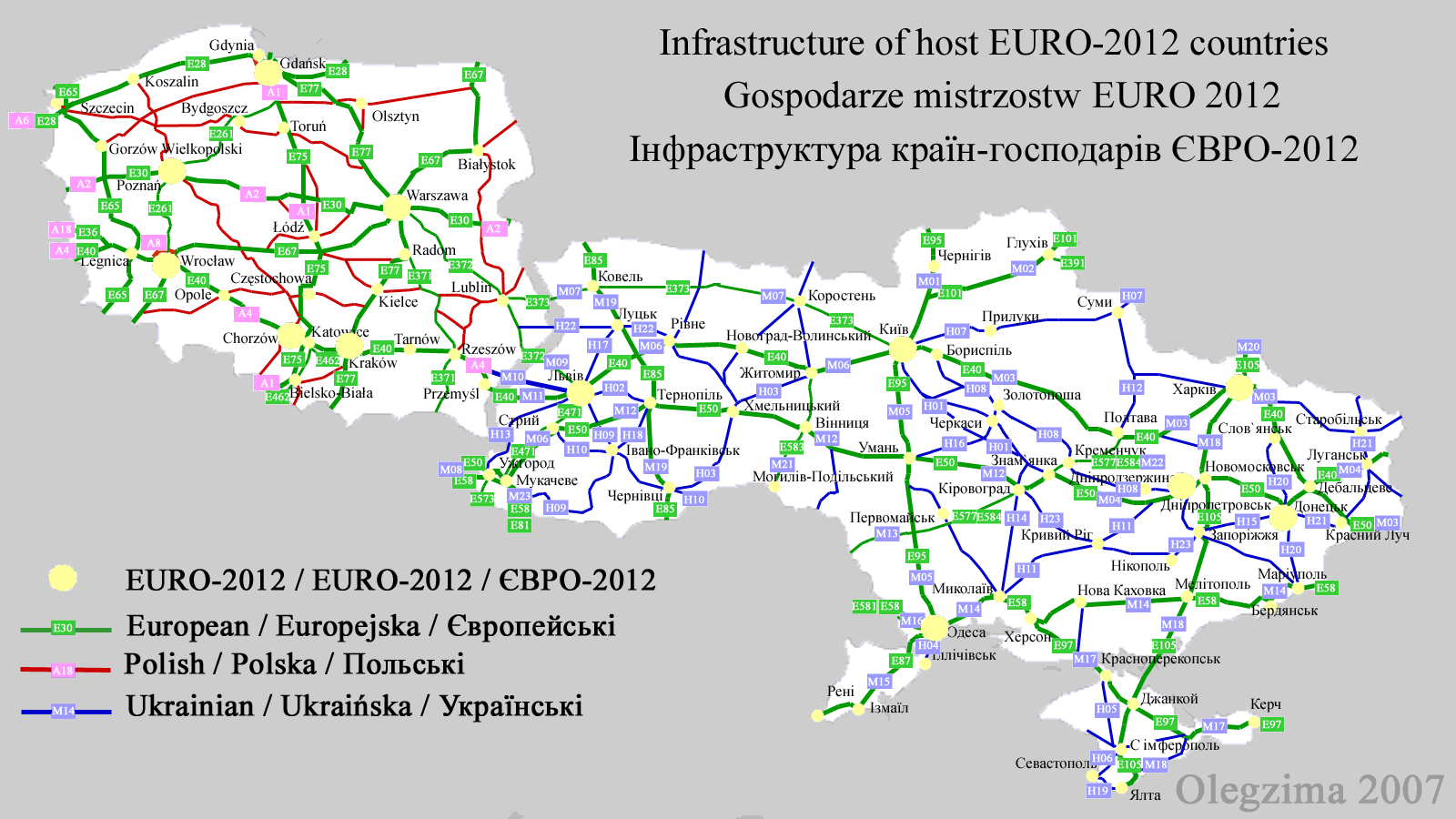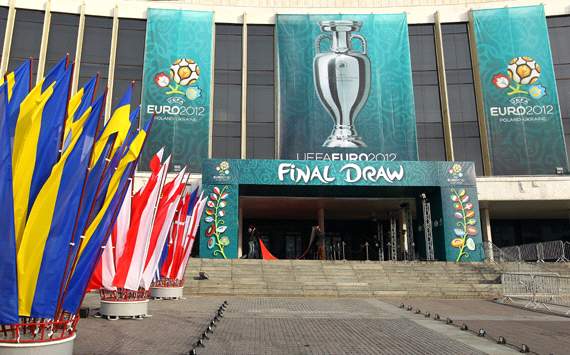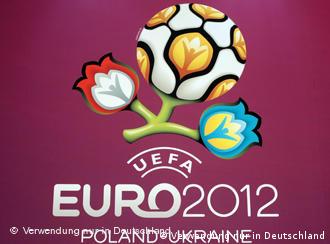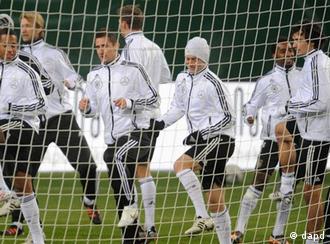The 2012 UEFA European Football Championship, commonly referred to as Euro 2012, will be the 14th European Championship for national football teams sanctioned by UEFA. The final tournament will be hosted by Poland and Ukraine between 8 June and 1 July 2012. It is the first time that either nation has hosted the tournament. This bid was chosen by UEFA's Executive Committee in 2007.[1]
The final tournament features sixteen nations, the last European Championship to do so (from Euro 2016 onward, there will be 24 finalists). Qualification was contested by 51 nations between August 2010 and November 2011 to join the two host nations in the tournament. The winner of the tournament gains automatic entry to the 2013 FIFA Confederations Cup hosted by Brazil.[2
The final tournament features sixteen nations, the last European Championship to do so (from Euro 2016 onward, there will be 24 finalists). Qualification was contested by 51 nations between August 2010 and November 2011 to join the two host nations in the tournament. The winner of the tournament gains automatic entry to the 2013 FIFA Confederations Cup hosted by Brazil.[2
Background
Readiness concerns
In January 2008, UEFA president Michel Platini went on the record to warn the organisers of the need to avoid "critical slippages" in their preparations,[3] prompting Scotland to reportedly inform UEFA that they would be willing to step in as hosts,[4] which they reiterated again later in the year.[5] However, by June 2008, UEFA stated they were "not discussing any plan B in terms of new countries" hosting.[6]
Ukraine reported several problems which threatened their ability to co-host: delays in the renovation of Kiev’s Olympic Stadium,[7] and difficulties funding infrastructure work after the economic crisis struck.[8] After an inspection in April 2009, Platini re-affirmed that Ukraine would remain co-host but hinted that most matches could go to Poland.[9] The Polish Prime Minister Donald Tusk stated his country would be capable of this task, but was committed to the original 4 + 4 host city plan,[10] as was the Polish FA.[11]
Poland's one major incident occurred in late September 2008, when its government suspended the Polish Football Association (PZPN) over corruption issues and assigned an administrator. UEFA swiftly issued a letter warning that it risked losing the right to co-host,[12] which resulted in the government yielding.[13] Preparation work proceeded more speedily than in Ukraine and, following a visit in April 2009, Platini announced that all was on track and he saw no major problems.[9] The following month, UEFA confirmed the appointment of the Polish cities of Warsaw, Poznań, Wrocław and Gdańsk.[14] At the same meeting, an appeal for delayed decision on the Ukrainian venues was granted to Lviv, Donetsk and Kharkiv in order to meet specific conditions regarding infrastructure, with a warning that only Kiev and the best prepared city of the other candidates would otherwise be used if issues were not resolved by the end of November.[15][16][17][18]
In September 2009 Platini announced that "Ukraine has made sudden progress in their efforts to stage the tournament",[19] and it was soon confirmed that their four cities (Donetsk, Kharkiv, Kiev and Lviv) would host matches. Kiev was also confirmed to host the Final.[20]
An interview Platini gave to the German FA in May 2010, suggesting that Germany and Hungary could even replace Ukraine unless improvements were made, cast new doubt on their readiness.[21] But by August, Platini revisited that and stated "You can consider that the ultimatum no longer exists",[22] and that he was optimistic about preparations in both countries and saw no major obstacles.[23] After a UEFA delegation visited Ukraine in September 2011, he stated the country was "virtually ready for Euro 2012
Ukraine reported several problems which threatened their ability to co-host: delays in the renovation of Kiev’s Olympic Stadium,[7] and difficulties funding infrastructure work after the economic crisis struck.[8] After an inspection in April 2009, Platini re-affirmed that Ukraine would remain co-host but hinted that most matches could go to Poland.[9] The Polish Prime Minister Donald Tusk stated his country would be capable of this task, but was committed to the original 4 + 4 host city plan,[10] as was the Polish FA.[11]
Poland's one major incident occurred in late September 2008, when its government suspended the Polish Football Association (PZPN) over corruption issues and assigned an administrator. UEFA swiftly issued a letter warning that it risked losing the right to co-host,[12] which resulted in the government yielding.[13] Preparation work proceeded more speedily than in Ukraine and, following a visit in April 2009, Platini announced that all was on track and he saw no major problems.[9] The following month, UEFA confirmed the appointment of the Polish cities of Warsaw, Poznań, Wrocław and Gdańsk.[14] At the same meeting, an appeal for delayed decision on the Ukrainian venues was granted to Lviv, Donetsk and Kharkiv in order to meet specific conditions regarding infrastructure, with a warning that only Kiev and the best prepared city of the other candidates would otherwise be used if issues were not resolved by the end of November.[15][16][17][18]
In September 2009 Platini announced that "Ukraine has made sudden progress in their efforts to stage the tournament",[19] and it was soon confirmed that their four cities (Donetsk, Kharkiv, Kiev and Lviv) would host matches. Kiev was also confirmed to host the Final.[20]
An interview Platini gave to the German FA in May 2010, suggesting that Germany and Hungary could even replace Ukraine unless improvements were made, cast new doubt on their readiness.[21] But by August, Platini revisited that and stated "You can consider that the ultimatum no longer exists",[22] and that he was optimistic about preparations in both countries and saw no major obstacles.[23] After a UEFA delegation visited Ukraine in September 2011, he stated the country was "virtually ready for Euro 2012
Venues
Apart from Donetsk and Kharkiv, the host cities are all popular tourist destinations (the latter having replaced Dnipropetrovsk as a host city in 2009).[25] The bid package requires the expansion and modernisation of roads and transport links.[26]
The obligatory improvement of the football infrastructure includes the building of new stadiums: Six of the eight venues are brand new stadia currently being constructed ready to open in advance of the tournament; the remaining two (in Poznań and Kharkiv) have undergone major renovations to improve them.[27][28] Three of the stadia will fulfill the criteria of UEFA's highest category stadiums.
In a return to the format used at Euro 1992, Euro 1996 and Euro 2008, each group will be based around two stadia
The obligatory improvement of the football infrastructure includes the building of new stadiums: Six of the eight venues are brand new stadia currently being constructed ready to open in advance of the tournament; the remaining two (in Poznań and Kharkiv) have undergone major renovations to improve them.[27][28] Three of the stadia will fulfill the criteria of UEFA's highest category stadiums.
In a return to the format used at Euro 1992, Euro 1996 and Euro 2008, each group will be based around two stadia









